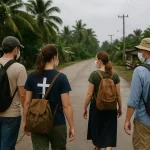- General Religious Landscape
- Current Views Toward Christianity
- US vs India Living Comparison for Missionaries
- How to Travel Safely in India as a Christian
- Top 5 Causes of Death in India
- Christian Martyrdom: Historic & Recent
- Transportation Risks
- Natural Disasters & Climate Hazards
- Cybersecurity & Digital Safety
- Cultural Sensitivities & Legal Considerations
 #
#
General Religious Landscape #
India is home to a rich tapestry of religions. Hinduism is the majority, followed by Islam, Christianity, Sikhism, Buddhism, Jainism, and others. Christians make up roughly 2–3% of the population, with significant communities in Kerala, Nagaland, Mizoram, and parts of Northeast India. Religious identity often intersects with ethnicity and regional politics.
Current Views Toward Christianity #
India constitutionally guarantees freedom of religion, but there are increasing reports of hostility against Christians. Several states have enacted anti-conversion laws, which are sometimes misused to target Christian missionaries. Social hostility, accusations of forced conversion, and occasional mob violence have been reported.
US vs India Living Comparison for Missionaries #
| Aspect | USA | India |
|---|---|---|
| Infrastructure | Reliable | Urban areas: good; Rural areas: limited |
| Healthcare | Accessible, insured | City care is good; rural areas lack resources |
| Safety | Generally safe | Varies; some regions pose risk to minorities |
| Religious Freedom | Protected | Protected legally, but societal tension exists |
| Cost of Living | Higher | Lower, but varies by region |
General Risk Level #
Moderate to High – depends heavily on region, activity, and visibility. Humanitarian work is safer than public evangelism.
How to Travel Safely in India as a Christian #
Recommended Safety Measures #
- Register with the U.S. STEP program.
- Use discretion in public evangelism.
- Maintain situational awareness and local contacts.
- Have international medical insurance with evacuation coverage.
- Avoid areas known for religious conflict.
Recent Incidents #
- Arrests of Christian nuns and laypeople in Chhattisgarh under false charges.
- Numerous reported attacks on churches in Manipur and other Northeast regions.
- Rising incidents of mobs disrupting Christian gatherings in multiple states.
US Embassy Presence #
The U.S. has an embassy in New Delhi and consulates in Mumbai, Chennai, Hyderabad, and Kolkata. Services include emergency assistance, travel advisories, and WhatsApp alert systems for real-time updates.
Political Climate & Stability #
India remains politically stable but experiences intermittent civil unrest. Religious nationalism is on the rise in some regions, leading to localized tensions and protests. Some areas remain sensitive to religious activity, especially by outsiders.
Crime & Personal Safety #
- Petty theft is common in tourist areas.
- Scams targeting foreigners occur regularly.
- Avoid traveling alone at night or to unfamiliar rural areas.
Health & Medical #
- Vaccinations required: Hepatitis A & B, Typhoid, Tetanus, Polio, COVID-19.
- Malaria and dengue risks in tropical areas.
- Air pollution is high in major cities – consider N95 masks.
Emergency Health Care Availability #
- Urban areas: high-quality hospitals accessible within 30–60 minutes.
- Rural areas: 2–6 hour travel to major hospitals not uncommon.
- Public hospitals: long waits, lower cost.
- Private hospitals: faster service, higher costs, often require upfront payment.
- Common U.S. medications are available, but specific brands may not be.
Top 5 Causes of Death in India #
- Ischemic heart disease
- Chronic respiratory diseases
- Stroke
- Lower respiratory infections
- Neonatal conditions
Christian Martyrdom: Historic & Recent #
- Historic persecution occurred during British and Mughal eras in various regions.
- Recent incidents include church destruction and forced renunciation of faith in Manipur.
- 2025 arrest of nuns and accusations of forced conversion gained national attention.
Transportation Risks #
- Road travel is risky: high accident rate, poor road conditions in rural areas.
- Train travel is common but can be overcrowded.
- Air travel is generally safe and reliable within major hubs.
Natural Disasters & Climate Hazards #
- Annual monsoon flooding affects roads and travel safety.
- Heatwaves and poor air quality can pose health threats.
- Some regions are prone to earthquakes and cyclones.
Cybersecurity & Digital Safety #
- Monitor social media activity; sensitive religious/political posts may be flagged.
- Avoid public Wi-Fi for financial or private communication.
- Use VPNs and secure messaging apps when possible.
Cultural Sensitivities & Legal Considerations #
- Modest dress is expected, especially in rural or traditional areas.
- Alcohol is banned in some states; public intoxication is socially frowned upon.
- Proselytizing is highly sensitive; anti-conversion laws are enforced in several states.
- Avoid public criticism of religious or political figures.
Note #
This document is provided for informational purposes only and should not substitute for real-time updates from official government advisories.







